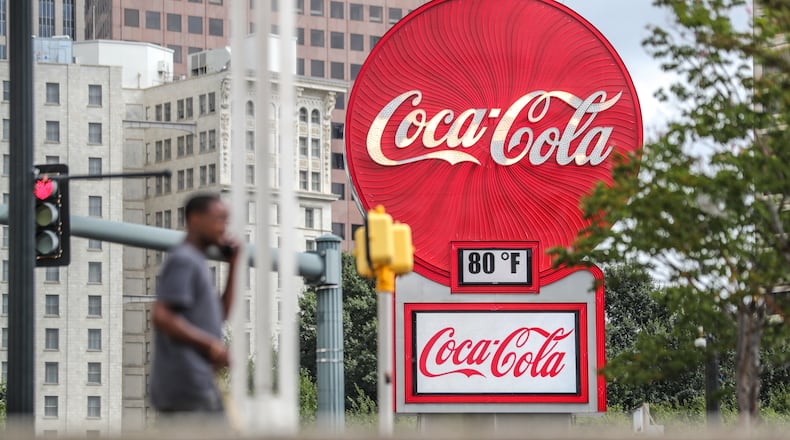As Americans wait to see what impact tariffs have on everyday goods, Atlanta-based Coca-Cola has been thinking for months about how it may navigate the increased import taxes implemented by President Donald Trump.
The trade policies may lead Coca-Cola to increase prices for U.S. buyers and could affect its progress on sustainability goals.
But one expert says it’s not just tariffs that are a threat to the company — the international backlash to Trump’s tariffs could have an even bigger impact.
Trump started announcing new tariffs, which are taxes on imports into the U.S., in early February against Mexico, Canada and China. He broadened his tariffs last week to almost every country in the world, announcing 10% blanket tariffs and higher individualized rates for specific countries.
Trump has touted tariffs as a revenue generator for the government, a spur to get manufacturing jobs reshored, a way to encourage foreign investment in the U.S. and as leverage to renegotiate what he considers unfair trade deals. But reshoring takes time and is costly. Other countries, meanwhile, are taking aim with their own countermeasures.
China quickly retaliated, announcing 34% tariffs against U.S. imports and banning business with six American agriculture companies, including two Georgia-based poultry firms. On Monday, Trump threatened to put additional 50% tariffs on China on top of the 54% the U.S. already announced against the country.
Back in February, when Trump had only announced initial import tax rates against China, Mexico and Canada, Coca-Cola was already aware of the risks, according to its 2024 annual report.
The company wrote that “new, expanded or retaliatory tariffs” could impact its profitability because they could raise the cost of key raw materials and other supplies, or affect their availability.
Coca-Cola gets sucralose, a sweetener it considers a critical raw material for its drinks, from suppliers mainly in the U.S. and China, though it’s unclear where the sweetener sourced from each country is used.
Coca-Cola declined to comment.
To operate its vast global network, Coca-Cola works with bottling partners in a variety of countries. The company provides the concentrates, beverage bases and syrups to its partners, who in turn make the finished products and distribute them to customers, like grocery stores, movie theaters and amusement parks.
But the company’s operations aren’t wholly reliant on international trade, according to James Quincey, Coca-Cola’s CEO.
“The vast majority of everything that’s consumed in the U.S. is made in the U.S.” Quincey said during an earnings call in February.
“Similarly, we’ve merged every country around the world. And so while it’s a global business, it’s very local. So yes, every bottler will be importing something from somewhere as a piece of the puzzle, but the economics are more predominantly local than they are global,” he added.
Credit: arvin.temkar@ajc.com
Credit: arvin.temkar@ajc.com
The 25% tariffs on aluminum imports implemented in March will increase the cost of cans in the U.S., but Quincey said the company has a series of strategies to adapt. The company can shift to making more plastic bottles and raising prices.
It can also make changes in its supply chain and use price hedging on key materials — such as aluminum — to manage costs and supply, according to Quincey.
But the decreased availability and increased cost of alternative packaging materials could lead Coca-Cola “to rely more on plastic packaging than desired,” according to its annual report, which could impact its progress on sustainability goals.
Additionally, if Coke products go up in price, consumers may stop buying it because soda is considered an “affordable luxury,” according to Duane Stanford, editor and publisher of trade publication Beverage Digest.
Stanford told The Atlanta Journal-Constitution that if a certain part of the consumer base is feeling anxious “or they’re feeling financially insecure, so they’re pulling back on discretionary purchases, I mean, those are the kinds of things that could have an impact.”
Coca-Cola also acknowledges that price increases could hurt its bottom line.
“Consumers may be less willing to pay a price differential for our branded products and may increasingly purchase lower-priced offerings, or may forgo some purchases altogether,” the beverage giant wrote in its annual report.
“To the extent that price increases are not sufficient to offset higher costs adequately or in a timely manner, and/or if they result in significant decreases in sales volume, our financial condition or results of operations may be adversely affected.”
But Stanford noted Coca-Cola could withstand a pullback in some markets because it has so many customers across the globe. Coke products are available in more than 200 countries and territories.
Though it is an iconic American brand, the U.S. does not account for even a quarter of its sales. Coca-Cola measures sales by unit case, which is a unit of measurement equal to 192 U.S. fluid ounces of finished beverage, the equivalent of 16 regular-size cans of Coke.
Last year, the U.S. represented 16% of Coke’s unit case volume, meaning the vast majority of its sales were overseas. The top countries for sales outside of the U.S. were Mexico, China, Brazil and India, which together accounted for one-third of all of Coca-Cola’s unit case volume in 2024.
Mexico, China and India have all been hit with high individualized tariff rates by Trump. China has retaliated and Mexico’s president threatened retaliation before striking a deal with Trump that exempted many of the country’s products from the new import taxes.
But it’s not just other country’s leaders that are pushing back against Trump — there’s a growing movement across the world, particularly Europe and Canada, to boycott American brands, including Coca-Cola.
Stanford called the boycotts “as big, if not a bigger risk, than, frankly, just a raw cost from these tariffs.”
“By no means is anybody super clear on exactly what these tariffs are going to mean long term because there’s so many factors,” he said, “but I do think that reputational risk is probably bigger in my mind than even the tariffs themselves.”
— The AJC’s Kelly Yamanouchi contributed to this report.
The Atlanta Journal-Constitution and Report for America are partnering to add more journalists to cover topics important to our community. Please help us fund this important work here.
About the Author
Keep Reading
The Latest
Featured




